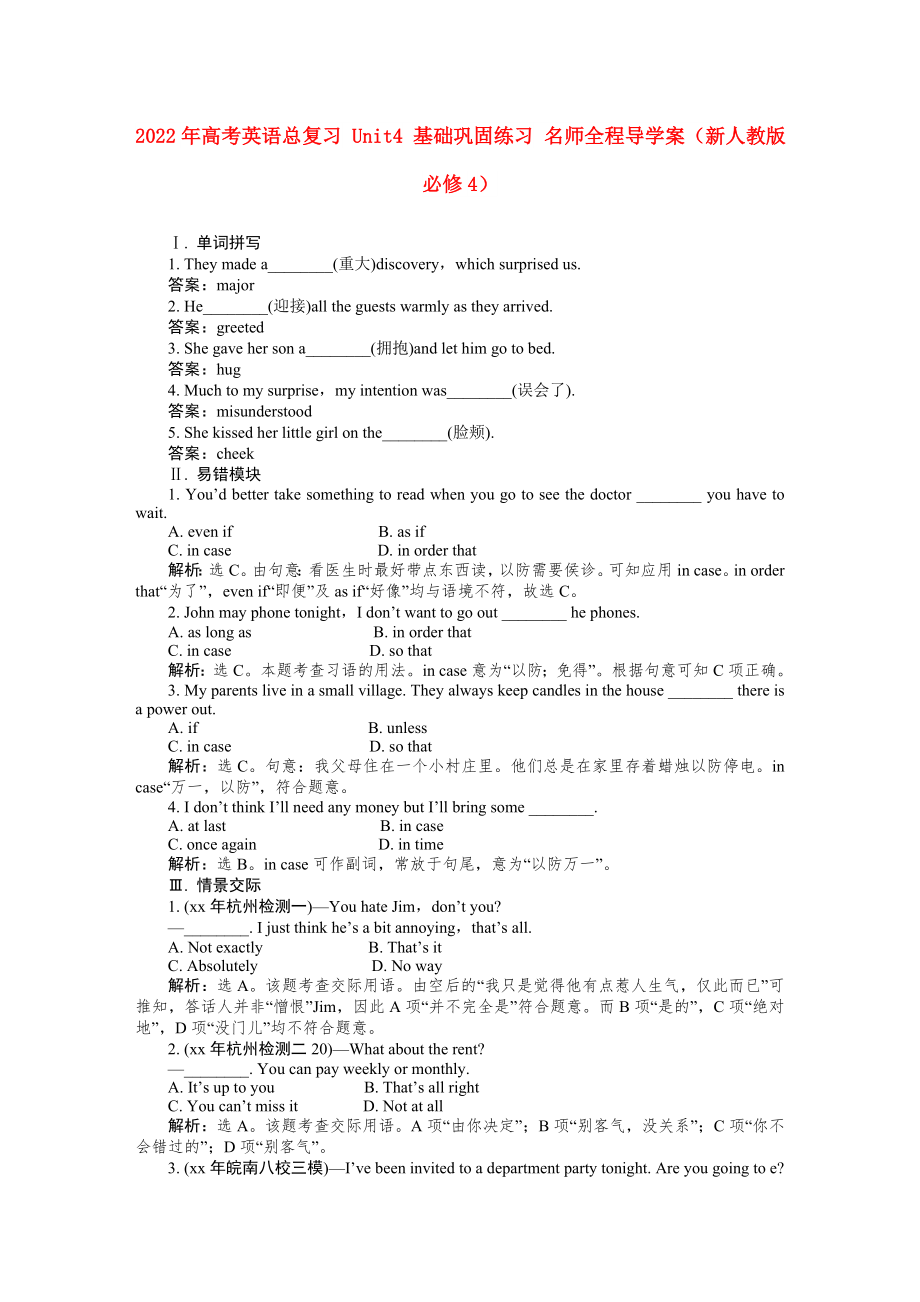《2022年高考英語(yǔ)總復(fù)習(xí) Unit4 基礎(chǔ)鞏固練習(xí) 名師全程導(dǎo)學(xué)案(新人教版必修4)》由會(huì)員分享�,可在線(xiàn)閱讀,更多相關(guān)《2022年高考英語(yǔ)總復(fù)習(xí) Unit4 基礎(chǔ)鞏固練習(xí) 名師全程導(dǎo)學(xué)案(新人教版必修4)(2頁(yè)珍藏版)》請(qǐng)?jiān)谘b配圖網(wǎng)上搜索����。
1、2022年高考英語(yǔ)總復(fù)習(xí) Unit4 基礎(chǔ)鞏固練習(xí) 名師全程導(dǎo)學(xué)案(新人教版必修4)
Ⅰ. 單詞拼寫(xiě)
1. They made a________(重大)discovery��,which surprised us.
答案:major
2. He________(迎接)all the guests warmly as they arrived.
答案:greeted
3. She gave her son a________(擁抱)and let him go to bed.
答案:hug
4. Much to my surprise�,my intention was__
2、______(誤會(huì)了).
答案:misunderstood
5. She kissed her little girl on the________(臉頰).
答案:cheek
Ⅱ. 易錯(cuò)模塊
1. You’d better take something to read when you go to see the doctor ________ you have to wait.
A. even if B. as if
C. in case D. in order that
解析:選C����。由句意:看醫(yī)生時(shí)
3、最好帶點(diǎn)東西讀,以防需要侯診��??芍獞?yīng)用in case。in order that“為了”���,even if“即便”及as if“好像”均與語(yǔ)境不符���,故選C。
2. John may phone tonight���,I don’t want to go out ________ he phones.
A. as long as B. in order that
C. in case D. so that
解析:選C�。本題考查習(xí)語(yǔ)的用法��。in case意為“以防����;免得”。根據(jù)句意可知C項(xiàng)正確�。
3. My parents live
4、in a small village. They always keep candles in the house ________ there is a power out.
A. if B. unless
C. in case D. so that
解析:選C�����。句意:我父母住在一個(gè)小村莊里。他們總是在家里存著蠟燭以防停電��。in case“萬(wàn)一�����,以防”����,符合題意。
4. I don’t think I’ll need any money but I’ll bring some ________.
A. at
5��、 last B. in case
C. once again D. in time
解析:選B�。in case可作副詞,常放于句尾���,意為“以防萬(wàn)一”。
Ⅲ. 情景交際
1. (xx年杭州檢測(cè)一)—You hate Jim�����,don’t you?
—________. I just think he’s a bit annoying����,that’s all.
A. Not exactly B. That’s it
C. Absolutely D. No way
解析:選
6、A。該題考查交際用語(yǔ)�。由空后的“我只是覺(jué)得他有點(diǎn)惹人生氣,僅此而已”可推知����,答話(huà)人并非“憎恨”Jim,因此A項(xiàng)“并不完全是”符合題意���。而B(niǎo)項(xiàng)“是的”�,C項(xiàng)“絕對(duì)地”�����,D項(xiàng)“沒(méi)門(mén)兒”均不符合題意���。
2. (xx年杭州檢測(cè)二20)—What about the rent?
—________. You can pay weekly or monthly.
A. It’s up to you B. That’s all right
C. You can’t miss it D. Not at all
解析:選A����。該題考查交際用語(yǔ)���。A項(xiàng)“由你決定”���;B項(xiàng)“
7�����、別客氣����,沒(méi)關(guān)系”��;C項(xiàng)“你不會(huì)錯(cuò)過(guò)的”�;D項(xiàng)“別客氣”。
3. (xx年皖南八校三模)—I’ve been invited to a department party tonight. Are you going to e?
—Oh���,I’d really like to���,but I have a ton of work. ________.
A. Thank you anyway B. You’re wele
C. All right. D. With pleasure
解析:選A?��?疾榻浑H用語(yǔ)。由空前的“但是我有許多工作(要做)”可知
8�����、���,空格處應(yīng)用A�,表示“不管怎樣,都謝謝你”�。
4. (xx年安徽示范性高中聯(lián)考)—I wonder if you’d mind me asking you some personal questions.
—No,not at all. ________.
A. Go ahead B. No way
C. That’s it D. Help yourself
解析:選A����。考查交際用語(yǔ)����。根據(jù)No,not at all(一點(diǎn)兒也不介意)��,可知用Go ahead�,此時(shí)意為“問(wèn)吧”。No way肯定不����,沒(méi)門(mén)兒;That’s it
9�����、說(shuō)對(duì)了���;Help yourself請(qǐng)隨便(吃����、用等)。
Ⅳ. 語(yǔ)法專(zhuān)練
本單元語(yǔ)法——v. -ing形式作狀語(yǔ)
1. (xx年海南萬(wàn)寧月考)Last Sunday��,my cousin sent me an e-mail ________me to his birthday party.
A. invited B. inviting
C. to invite D. having invited
解析:選B��。此題考查非謂語(yǔ)動(dòng)詞作定語(yǔ)���。在英語(yǔ)中��,過(guò)去分詞作定語(yǔ)表示被動(dòng)和完成�����,不強(qiáng)調(diào)時(shí)間的先后關(guān)系�;現(xiàn)在分詞作定語(yǔ)表示主動(dòng)和進(jìn)行�����。若
10�、表示被動(dòng)和進(jìn)行���,則要用being done的形式��;一般不用having done的形式作定語(yǔ)�;動(dòng)詞不定式作定語(yǔ)表示將來(lái)。此題中用現(xiàn)在分詞作定語(yǔ)表示主動(dòng)����,改為定語(yǔ)從句則是which invited。
2. (xx年南昌調(diào)研)As the light turned green���,I stood for a moment�����,not________�,and asked myself what I was going to do.
A. moved B. moving
C. to move D. being moved
解析:選B����。考查非謂語(yǔ)動(dòng)
11�、詞。用現(xiàn)在分詞moving作伴隨狀語(yǔ)���。
3. The students entered the classroom����,smiling and________,and________down to have their lessons.
A. talked�;sat B. talking;sitting
C. talking���;sat D. talked��;sitting
解析:選C����。本句的謂語(yǔ)動(dòng)詞是entered. . . and sat����,smiling and talking是現(xiàn)在分詞作狀語(yǔ),表示伴隨動(dòng)作����。
4. (xx年西城質(zhì)檢)The food,
12�、________good,was soon sold out when it was taken to the market.
A. tasted B. being tasted
C. tasting D. having tasted
解析:選C����。分詞作非限制性定語(yǔ)����,邏輯主語(yǔ)the food與taste是主動(dòng)關(guān)系�,故用現(xiàn)在分詞����。
5. He sent me an email,________ to get some further information for his research.
A. hoped B. hoping
C. to hope D. hope
解析:選B�����??疾榉侵^語(yǔ)動(dòng)詞。根據(jù)語(yǔ)境分析���,此處用v. ing形式作伴隨狀語(yǔ)����,表示在sent me an email時(shí)的愿望�����。
 2022年高考英語(yǔ)總復(fù)習(xí) Unit4 基礎(chǔ)鞏固練習(xí) 名師全程導(dǎo)學(xué)案(新人教版必修4)
2022年高考英語(yǔ)總復(fù)習(xí) Unit4 基礎(chǔ)鞏固練習(xí) 名師全程導(dǎo)學(xué)案(新人教版必修4)

